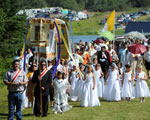Truth and Reconciliation Commission Held in Eskasoni
October 14, 2011
“No more nuns. No more priest. No more residential school. I am a survivor. I am strong and I am still her,” was the final statement Benjamin (Benji) Lafford left during the Truth and Reconciliation Commission (TRC) statement gathering in Eskasoni on October 14, 2011 at the Sarah Denny Cultural Center.
The statements heard that day by residential school survivors took great courage and emotional strength to publicly share their experience and trauma during their time at the Shubenacadie Residential School. But their stories had to be heard to begin the process of reconciliation.
Many stories were heard publicly but most were recorded privately. For those who spoke publicly, technical crew of TRC, broadcast the entire statement gathering live on the TRC website for the entire nation to hear.
Some of the statements heard were heart-wrenching while others had good memories of Shubie School.
For brother and sister, Ben Sylliboy (Mi’kmaq Grand Chief) and Margaret Poulette their memories of Shubie school were not as traumatic but they witnessed many things a child should not experience.
Both Ben and Margaret of Waycobah, went to Shubie school in 1947. Ben said we had no choice because both of our parents had Tuberculosis and we were forced to go. Ben recalls how hard it was at the start because he didn’t know how to speak in English and kids were punished if they spoke in Mi’kmaq.
Ben and Margaret stayed there for 5 years and never went home. Ben will never forget those times especially when June 30 arrived, kids called it freedom day and Ben would just wish that day would come for him and his little sister Margaret.
For Margaret, she was 4 years old in 1947 and witnessed a lot of abuse at such a young age. Margaret found darker skinned kids were always abused or picked on by the priest and nuns. She recalls one kid that used to stutter. A nun put a wooden wedge in his mouth all day. She said, “One girl spilled milk and she was strapped until her hand literally turned blue.”
Margaret will always remember during bedtime when kids would be sitting in toilette bowls with their blankets trying to sleep because they feared repercussions if they wet their beds during the night.
Margaret also had some good memories of Shubie school. She said, “We didn’t have much toys so I made myself a doll out of extra clothes I had.” Both Ben and Margaret also remember swimming in a lake and they always played on this hill outside.
After 5 years in the Shubie school both Ben and Margaret didn’t know how speak Mi’kmaq. For many years Margaret felt ashamed of being Indian but she praises Rita Joe and her poems and how Rita Joe was so proud of her culture and proud to be a Mi’kmaq.
Both siblings don’t blame the Church nor God, they blame the priest and nuns for all the wrong doing. To this day, they are both devoted Christians and both have played a productive role in their community of Waycobah.
For Benji Lafford and Georgina Doucette of Eskasoni their experience at Shubie school was of hardship and abuse and had a lasting effect on their lives after they left. Georgina already made her statement a few years back and she was literally sick for two years after the ordeal, “I cannot tell you what happened to me at the school. To repeat it again would be too devastating for me.” Georgina added, “I was stiff and couldn’t move because there was a story inside I couldn’t bring out but once I told that story it was like someone put me in another world. It was like someone told me you’ll be OK now.”
For Benji growing up in Shubie school for six years, his life was in turmoil after Shubie school, “I became an alcoholic, went to jail many times. My brother got shot and I was blamed for his death but I didn’t do it. I went jail for many years for something I didn’t do.”
Benji got to a point in his life when he felt like there was no point to live, “I wanted to die. Commit suicide. I had no life. No one told me right from wrong. I held my head down for many years because I was ashamed of who I was.”
For Georgina, life after Shubie school was filled with hardship. She became an alcoholic and said she was always full of anger and her children suffered. She said, “I took up my own journey of healing 24 years ago when I sobered up. We started a powwow. Families all got involved. Most of them were survivors who started a revival of our culture which was really needed. I’m proud we’ve gone a long way. We’ve have a lot to learn yet.”
For both Benji and Georgina, rediscovering their traditional ways through music, dance and the revival of the Mi’kmaq culture has been their best therapy. Benji became a traditional dancer 15 years ago, “I have more respect for my elders and culture than the Roman Catholic church. I like the sound of the drum. I love to dance, my life changed, I got married, had 6 beautiful children and I never punished them. I respect myself, I honor myself and I love my self. My spirit guide is the wolf and my protector is the eagle.”
Eskasoni Chief, Leroy Denny was given an opportunity to thank everyone who was at the TRC statement gathering. Chief Denny told the commissioners he would like to see that part of history in the curriculum of schools, “I hope we can pursue that so everybody knows the history of what Canada did to our young people.”
Chief Willie Littlechild, one of three commissioners for the hearings, said help is often embedded in each emotional story he has heard. “The mandate that we have, calls on us to not only to gather the stories but to find a way forward through reconciliation,” said Littlechild, who spent 14 years in a residential school. “In some cases we heard that the individual has been hiding that story within themselves for 45-50 years. Their families didn’t even know.”
“The challenge now,” he said, “Is to find ways based on what they are hearing to develop better relations within the country.”
Georgina still sees the lasting effects of residential school in Eskasoni, “Why is it that we still have suicide in our community? We cannot even get the people that even push the drugs and the pills.”
Georgina final message to the commissioners was, “If any way TRC could help our young people today, I would die with a smile on my face.”
It has been estimated that about 150,000 students suffered abuse, cultural losses and even death at residential institutions, which operated from the 1870s through the 1970s. These are just four stories out of thousands.





